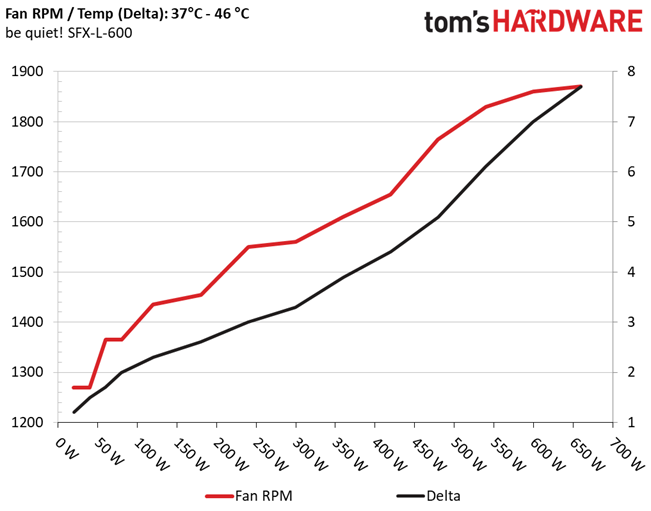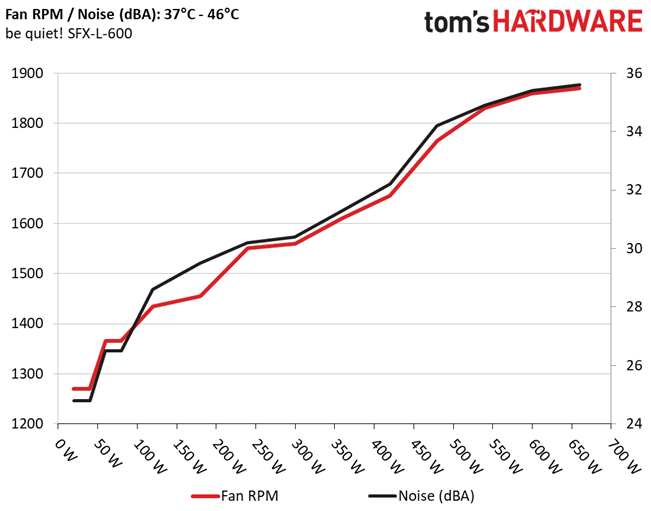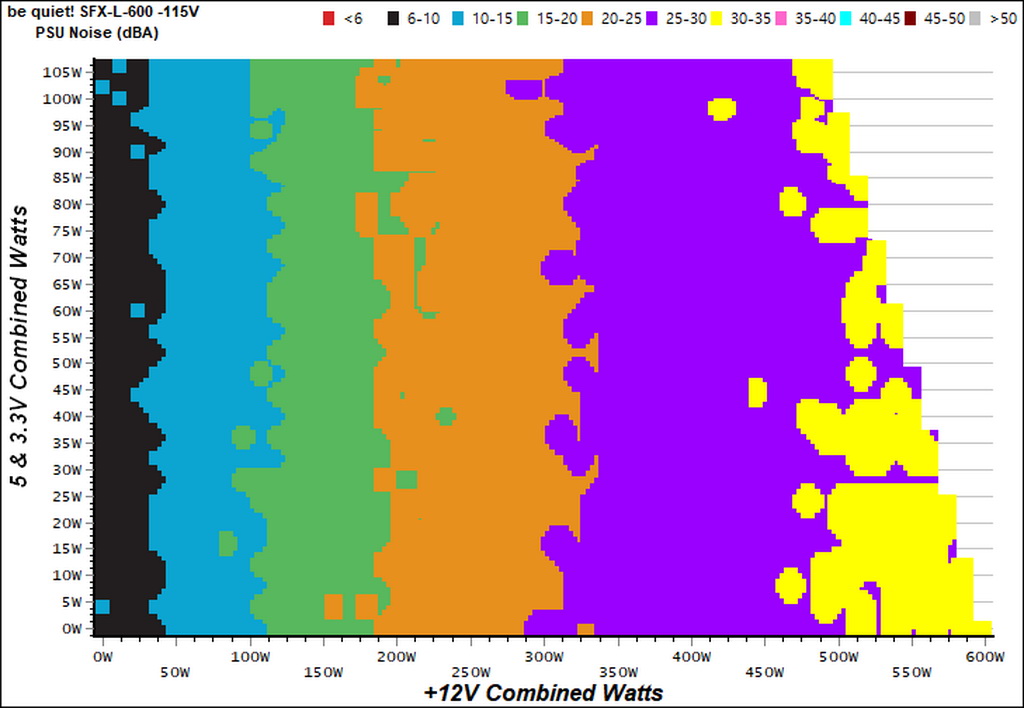be quiet! SFX L Power 600W PSU Review
Why you can trust Tom's Hardware
Efficiency, Temperature & Noise
Efficiency
Our efficiency testing procedure is detailed here.
Using results from the previous page, we plotted a chart showing the SFX L Power 600W's efficiency at low loads, and loads from 10 to 110 percent of its maximum-rated capacity.
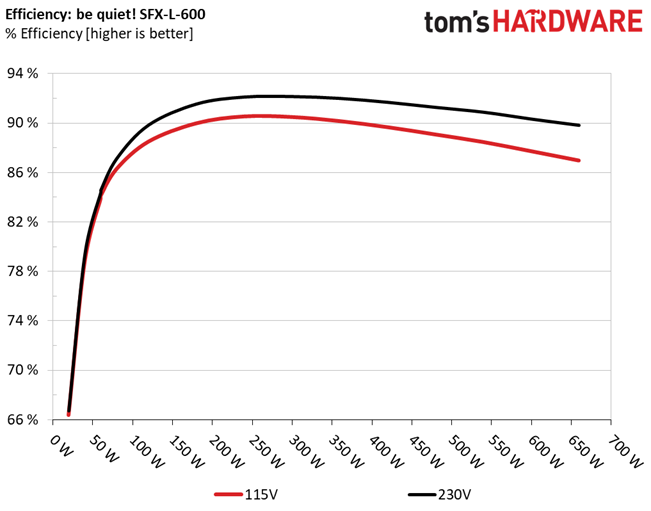
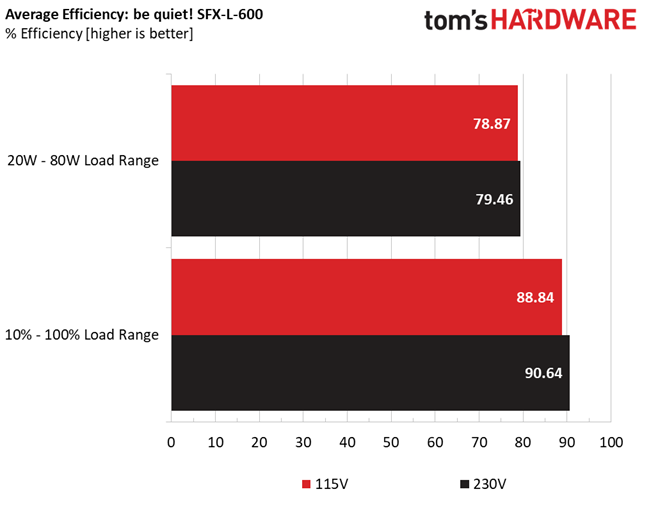
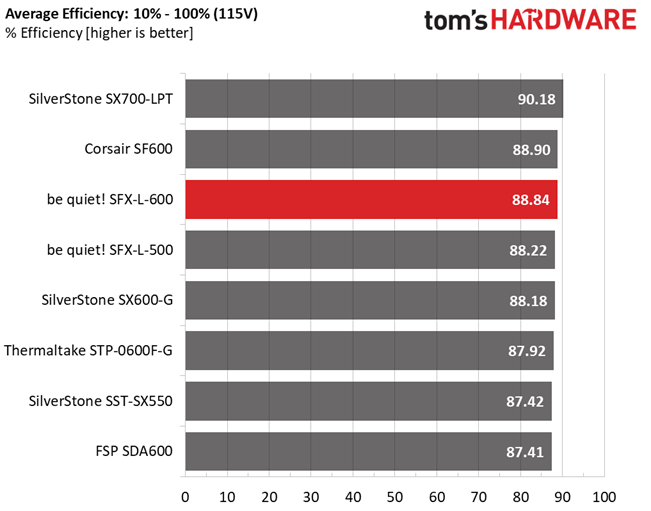
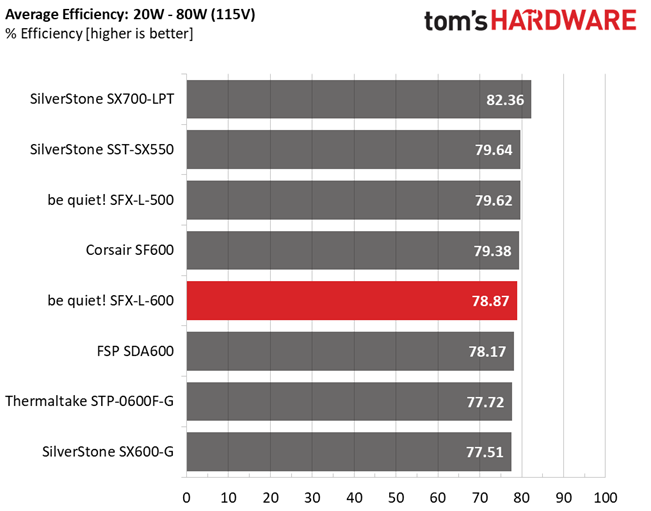
Under normal loads, this platforms achieves a high overall efficiency score. Meanwhile, it lands around the middle of the pack with light loads.
Efficiency At Low Loads
In the following tests, we measure the SFX L Power 600W's efficiency at loads significantly lower than 10 percent of its maximum capacity (the lowest load the 80 PLUS standard measures). The loads we dialed were 20, 40, 60, and 80W. This is important for representing when a PC is idle, with power-saving features turned on.
| Test # | 12V | 5V | 3.3V | 5VSB | DC/AC (Watts) | Efficiency | Fan Speed | Fan Noise | PF/AC Volts |
|---|---|---|---|---|---|---|---|---|---|
| 1 | 1.195A | 0.492A | 0.471A | 0.196A | 19.704 | 66.381% | 1270 RPM | 24.8 dB(A) | 0.914 |
| 12.242V | 5.065V | 3.381V | 5.057V | 29.683 | 115.16V | ||||
| 2 | 2.411A | 0.980A | 0.973A | 0.396A | 39.750 | 78.721% | 1270 RPM | 24.8 dB(A) | 0.956 |
| 12.238V | 5.060V | 3.378V | 5.045V | 50.495 | 115.16V | ||||
| 3 | 3.621A | 1.477A | 1.481A | 5.035A | 59.867 | 84.091% | 1365 RPM | 26.5 dB(A) | 0.972 |
| 12.261V | 5.058V | 3.375V | 5.035V | 71.193 | 115.16V | ||||
| 4 | 4.829A | 1.975A | 1.955A | 0.796A | 79.754 | 86.268% | 1365 RPM | 26.5 dB(A) | 0.983 |
| 12.255V | 5.054V | 3.373V | 5.025V | 92.449 | 115.16V |
With 20W load, we would like to see over 70% efficiency. At 40W, it'd be great to calculate 80% efficiency. However, this PSU can't quite get there. In addition, its fan spins fast to facilitate decent airflow. We run these tests at >36°C, after all. Fortunately, noise output remains low.
5VSB Efficiency
The ATX specification, along with CEC, ErP Lot 3 2014 and ErP Lot 6 2010/2013, states that 5VSB standby supply efficiency should be as high as possible, recommending 75 percent or higher with 550mA, 1A, and 1.5A of load. The PSU should also achieve higher than 75% efficiency at 5VSB under full load, or with 3A if its max current output on this rail is higher than 3A.
We take six measurements: one each at 100, 250, 550, 1000, and 1500mA, and one with the full load the 5VSB rail can handle.
Get Tom's Hardware's best news and in-depth reviews, straight to your inbox.
| Test # | 5VSB | DC/AC (Watts) | Efficiency | PF/AC Volts |
|---|---|---|---|---|
| 1 | 0.101A | 0.518 | 71.056% | 0.099 |
| 5.115V | 0.729 | 115.16V | ||
| 2 | 0.251A | 1.284 | 75.618% | 0.190 |
| 5.107V | 1.698 | 115.17V | ||
| 3 | 0.542A | 2.760 | 79.654% | 0.271 |
| 5.094V | 3.465 | 115.17V | ||
| 4 | 1.002A | 5.081 | 79.903% | 0.322 |
| 5.072V | 6.359 | 115.17V | ||
| 5 | 1.501A | 7.580 | 80.152% | 0.347 |
| 5.049V | 9.457 | 115.17V | ||
| 6 | 3.002A | 14.927 | 78.042% | 0.387 |
| 4.973V | 19.127 | 115.16V |
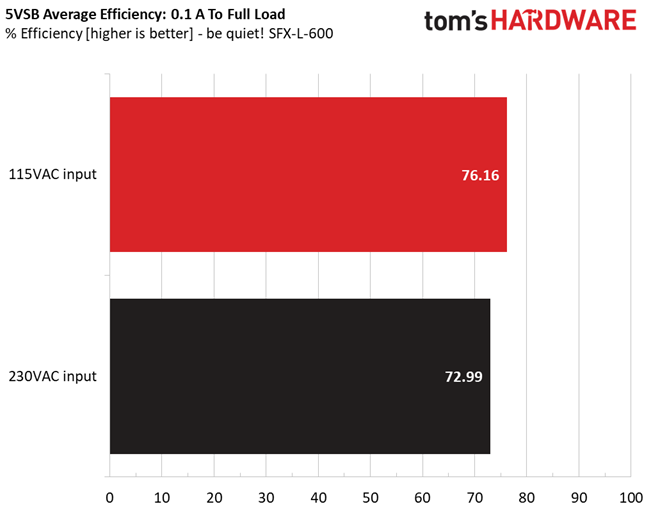
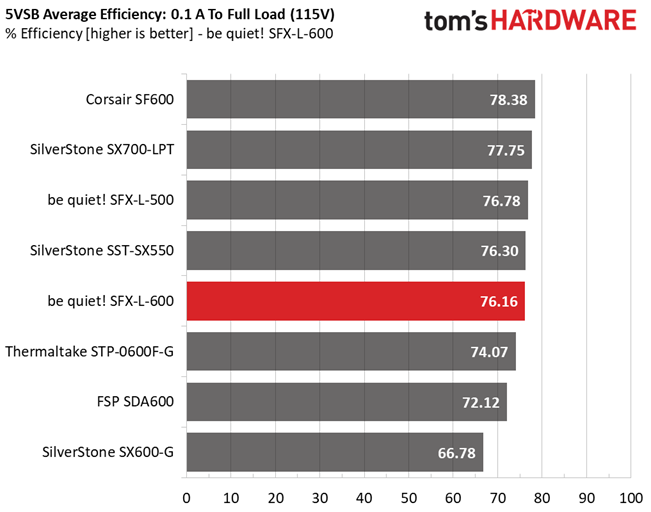
The 5VSB rail's efficiency levels are good, given that we see one reading over 80% and two others in the same neighborhood.
Power Consumption In Idle And Standby
In the table below, you'll find the power consumption and voltage values of all rails (except -12V) when the PSU is idle (powered on, but without any load on its rails), and the power consumption when the PSU is in standby mode (without any load, at 5VSB).
| Mode | 12V | 5V | 3.3V | 5VSB | Watts | PF/AC Volts |
|---|---|---|---|---|---|---|
| Idle | 12.245V | 5.070V | 3.385V | 5.070V | 9.350 | 0.637 |
| 115.2V | ||||||
| Standby | 0.075 | 0.011 | ||||
| 115.2V |
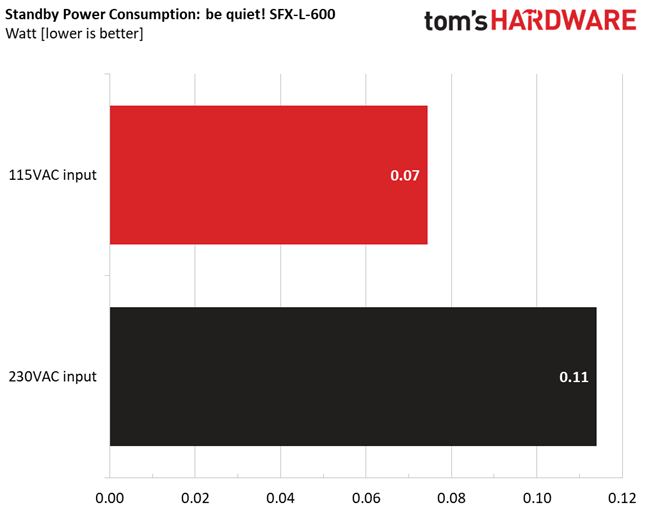
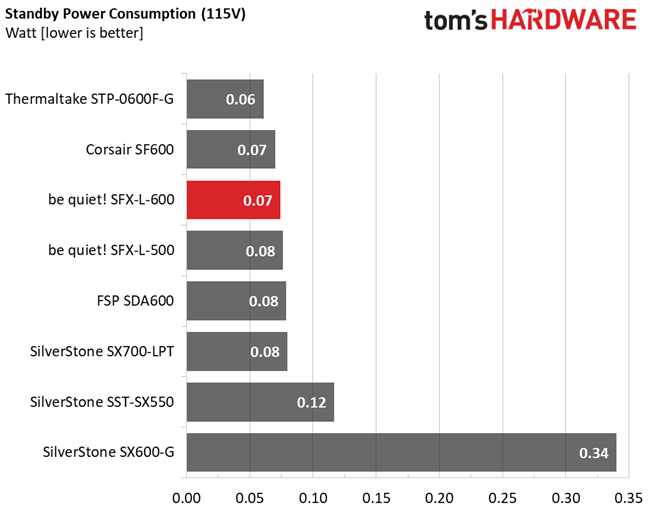
Vampire power is low with 115V and 230V input.
Fan RPM, Delta Temperature, And Output Noise
Our mixed noise testing is described in detail here.
The first chart below illustrates the cooling fan's speed (in RPM), and the delta between input and output temperature. The results were obtained at 37°C (98.6°F) to 46°C (114.8°F) ambient temperature.
The next chart shows the cooling fan's speed (again, in RPM) and output noise. We measured acoustics from one meter away, inside a hemi-anechoic chamber. Background noise inside the chamber was below 6 dB(A) during testing (it's actually much lower, but our sound meter’s microphone hits its floor), and the results were obtained with the PSU operating at 37°C (98.6°F) to 46°C (114.8°F) ambient temperature.
The following graph illustrates the fan's output noise over the PSU's operating range. The same conditions of the above graph apply to our measurements, though the ambient temperature was between at 30°C (86°F) to 32°C (89.6°F).
The 120mm fan spins slowly at up to 200W loads. Between 200W and 300W on the +12V rail, the PSU's noise output is below 25 dB(A). The 30 dB(A) mark is passed with 500W+ loads and up.
All in all, the fan profile is relaxed given this PSU's compact dimensions.
MORE: Best Power Supplies
MORE: How We Test Power Supplies
MORE: All Power Supply Content
Current page: Efficiency, Temperature & Noise
Prev Page Load Regulation, Hold-Up Time & Inrush Current Next Page Protection Features
Aris Mpitziopoulos is a contributing editor at Tom's Hardware, covering PSUs.
-
Aris_Mp The SF600 has higher performance. This is shown in the relative performance chart. However in the overall noise score the SF600 is much higher as well, because its fan profile gets highly aggressive once you load its minor rails. In real life conditions where the minor rails are lightly used, it is quite silent.Reply -
expert_vision You know what baffles me? How is it possible that no monitoring is offered in today PSUs ? I used to have a HighPower PSU 10 years ago that had a simple 7 segment display, showing instantaneous power draw in watts, and a 3 header pin for FAN RPM. You'd think by today that would be standard. But no, instead they put freaking RGB in everything ...Reply -
below I had bought one of them a few weeks ago and after installing in bitfenix portal case it has start to randomly make noises. I had rebuild my block two times just to make sure that there is nothing except PSU fan itself making that noise. The noise is comparably with very old HDD's or even Floppy crunching, its super annoying and only appears in PSU working state (when fan at the bottom) and mostly on high load, also noise could be very loudReply
Also I have found some review on Spanish (I think) from amazon about this PSU and customer have exactly the same issue, so looks like it could be design problem.
This PSU is a winner of most comparisons an reviews everywhere and I very dissapointed that none of reviewers couldn't find such awfull issue for quiet PSU.
Also it should be a shame for company named 'be quiet' that it's 'silent wings' in that PSU making that horrible noises.
